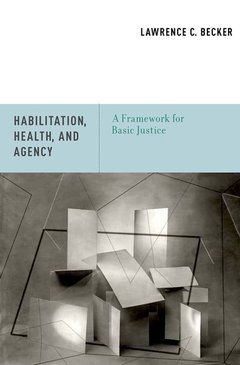Habilitation, Health, and Agency A Framework for Basic Justice
Langue : Anglais
Auteur : Becker Lawrence C.

Lawrence C. Becker introduces an unconventional set of background ideas for future philosophical work on normative theories of basic justice. The organizing concept is habilitation - the process of equipping a person or thing with functional abilities or capacities. The specific proposals drawn from the concept of habilitation are independent of any particular set of distributive principles. The result is a framework for theory that includes a metric for the pursuit of basic justice, but not a normative theory of it. The basic idea is that receiving and providing habilitation is a lifelong necessity for human beings, from the nearly helpless newborn state through the struggle to survive and thrive thereafter, even into the most severe diminishments of old age. This lifelong human necessity underlies all questions about basic justice, and the possibilities for habilitation define the circumstances under which those questions arise. Focusing on the circumstances of habilitation calls attention to the central role of physical and psychological health. Without basic good health in both domains, it is not possible to cope with the habilitative demands of one's physical and psychological endowments, and one's physical and social environments. And for human beings, a particular aspect of human health effectively sums up these matters: namely human agency; the nature and extent of the ability to act effectively. The book proposes, specifically, that normative theories of basic justice adopt the habilitation framework. What then appears to follow is that the most plausible comprehensive metric for assessing progress toward basic justice will be the level and distribution of basic good health. Moreover, achieving robustly healthy agency will be the most plausible tactical target for making progress toward basic justice -no matter what one's favored distributive principles might be.
Introduction. Part One: Habilitation and Basic Justice. Preface to Part One. 1. Basic Justice and Habilitation: Concept and Conception. 1. Basic Justice. 2. Habilitation: Concept and Conception. 3. Normative Theories with a Close Connection to Habilitation. 4. Habilitation: Conception and Framework. 2. The Circumstances of Habilitation for Basic Justice. 1. Functional Abilities in a Given Range of Environments. 2. Summary of the Circumstances of Habilitation. 3. The Centrality of Health and Agency. Part Two: Health, Healthy Agency, and the Health Metric. Preface to Part Two. 3. Eudaimonistic Health: Complete Health, Moral Development, Well-Being, and Happiness. 1. Health, Well-Being, and Virtue. 2. A Unified Conception of Health, Positive and Negative. 3. The Science of Mental Health, Happiness, and Virtue. 4. Health, Happiness, and Basic Justice. 4. Good Health as Reliably Competent Functioning. 1. Basic health: An Integrated, Limited General Concept. 2. Habilitation, Coping Abilities, and Agency. 3. Good (basic) Health as Reliably Competent Functioning. 5. Robustly Healthy Agency. 1. The Health Metric. 2. Health Science: Limited and Unified. 3. Habilitation into Robustly Healthy Agency. 6. Healthy Agency as the Representative Good for Basic Justice. 1. Healthy Agency versus Wealth and Income. 2. Healthy Agency versus Pluralism. 3. The Representativeness of Habilitation into Healthy Agency. 4. Theory All the Way Down: A Public Policy Objection. Part Three: Healthy Agency and the Norms of Basic Justice . Preface to Part Three. 7. Healthy Agency and Its Behavioral Tendencies. 1. Dispositions Toward Health and Habilitation. 2. Dispositions About the Subject Matter of Justice. 8. Healthy Agency and the Norms of Basic Justice. 1. Habilitative Necessities and Justice. 2. Habilitative Stability, Strength, and Efficiency. 3. Second-Order Norms,. 4. Moving Beyond Basic Justice. Part Four: Relevance, Influence, and Prejudice Revisited. Preface to Part Four. 9. Relevance, Influence, and Prejudice. 1. Exclusionary Reminders. 2. Comprehensiveness and Representativeness. 10. Conclusion and Extrication. 1. Health, Individual Liberty, and Social Stability: A Fantasy. 2. Approximations to Health. 3. Pseudo-Problems and Elusive Targets: Sensible Replies to the Foole. 4. Hope Rather than Fantasy. Acknowledgments. Bibliography.
Lawrence C Becker is a Fellow of Hollins University, and Professor of Philosophy Emeritus, College of William and Mary. He is the author of four previous monographs, including Property Rights (1977), Reciprocity (1986), and A New Stoicism (1998). With Charlotte B. Becker he co-edited two editions of the Encyclopedia of Ethics (1992; 2001).
Date de parution : 08-2012
Ouvrage de 208 p.
16.4x23.6 cm
Disponible chez l'éditeur (délai d'approvisionnement : 21 jours).
Prix indicatif 95,31 €
Ajouter au panierThèmes de Habilitation, Health, and Agency :
© 2024 LAVOISIER S.A.S.


